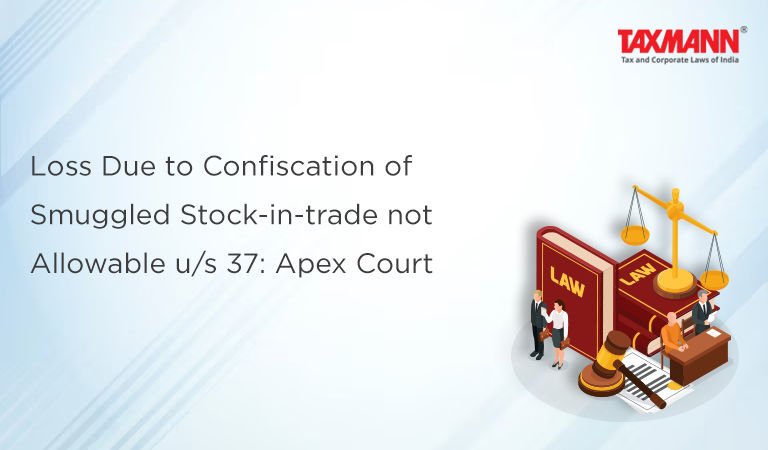Loss Due to Confiscation of Smuggled Stock-in-trade not Allowable u/s 37: Apex Court
- News|Blog|Income Tax|
- 2 Min Read
- By Taxmann
- |
- Last Updated on 26 April, 2023

Case Details: CIT v. Prakash Chand Lunia (D) Thr. Lrs. - [2023] 149 taxmann.com 416 (SC)
Judiciary and Counsel Details
-
- M.M. Sundresh, J.
Facts of the Case
Assessee was in the business of making jewellery. A search was conducted by the Directorate of Revenue Intelligence (DRI) officers at the premises taken on rent by the assessee and recovered slabs of silver.
Since the assessee failed to explain the source of the acquisition of silver, additions were made under section 69A and an assessment order was passed. Later, the assessee claimed loss of confiscation by the DRI official of the Customs Department was a business loss.
The matter reached the High Court, wherein loss was duly allowed relying upon the Supreme Court Ruling in the case of Piara Singh [1980] 3 Taxman 67 (SC). The revenue filed the instant appeal before the Supreme Court.
Supreme Court Held
The Supreme Court held that the judgement in the case of Piara Singh wrongly relied upon as the same pertained to an assessee who was engaged in the business of smuggling currency notes and for whom confiscation of the currency notes was a loss occasioned in pursuing his business.
In the instant case, the main business of the assessee was dealing in silver, and his business cannot be said to be the smuggling of silver bars, as was the case in the case of Piara Singh (supra).
In the assessee’s case, he was carrying on an otherwise legitimate silver business. To make larger profits, he indulged in the smuggling of silver, which was an infraction of the law.
The word ‘any expenditure’ mentioned in Section 37 takes in its sweep loss occasioned in the course of business, being incidental to it. As a consequence, any loss incurred by way of expenditure by an assessee for any purpose which is an offence or which is prohibited by law is not deductible in terms of Explanation 1 to Section 37.
Such an expenditure/loss incurred for any purpose which is an offence shall not be deemed to have been incurred for the purpose of business or profession or incidental to it, and hence, no deduction can be made.
A penalty or a confiscation is a proceeding in rem. Therefore, a loss in pursuance to the same is not available for deduction regardless of the nature of the business, as a penalty or confiscation cannot be said to be incidental to any business. Therefore, an appeal of revenue was allowed, and an order passed by the High Court stand set aside.
Disclaimer: The content/information published on the website is only for general information of the user and shall not be construed as legal advice. While the Taxmann has exercised reasonable efforts to ensure the veracity of information/content published, Taxmann shall be under no liability in any manner whatsoever for incorrect information, if any.

Taxmann Publications has a dedicated in-house Research & Editorial Team. This team consists of a team of Chartered Accountants, Company Secretaries, and Lawyers. This team works under the guidance and supervision of editor-in-chief Mr Rakesh Bhargava.
The Research and Editorial Team is responsible for developing reliable and accurate content for the readers. The team follows the six-sigma approach to achieve the benchmark of zero error in its publications and research platforms. The team ensures that the following publication guidelines are thoroughly followed while developing the content:
- The statutory material is obtained only from the authorized and reliable sources
- All the latest developments in the judicial and legislative fields are covered
- Prepare the analytical write-ups on current, controversial, and important issues to help the readers to understand the concept and its implications
- Every content published by Taxmann is complete, accurate and lucid
- All evidence-based statements are supported with proper reference to Section, Circular No., Notification No. or citations
- The golden rules of grammar, style and consistency are thoroughly followed
- Font and size that’s easy to read and remain consistent across all imprint and digital publications are applied



 CA | CS | CMA
CA | CS | CMA
